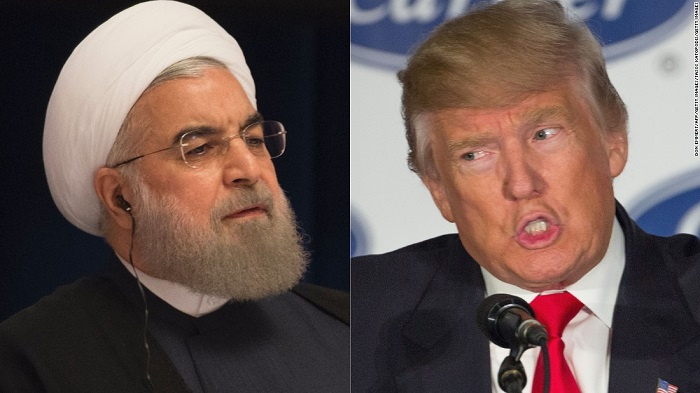Rouhani or Trump-- That is the Question

Rouhani was inaugurated as Iran’s president for a second term this Saturday while his political priority seems to be the preservation of the nuclear deal in the next four years. Even from an economic point of view, Iran needs to accelerate its use of economic opportunities realized with the deal. That explains why Rouhani took the opportunity to comment on the deal’s fate under the Trump administration during his sworn-in.
Beside the President’s acknowledgement that Iran would not be the side that violates the deal first, international media outlets highlighted Rouhani’s warning directed at the Trump administration officials. Inside the White House, a team of US president’s confidantes is supposed to prove by October, in efforts parallel to the State Department’s, that Iran has failed to comply with its commitments under the deal. At the same time, Mike Pompeo has assigned a new CIA team to find new means to impose pressure on Iran. Means of the kind are expected to test and ultimately break Iran’s patience, making it to walk out of the deal.
In the presence of Federica Mogherini, High Representative of the European Union for Foreign Affairs and Security Policy, Rouhani vowed not to remain idle in the face of continued US non-compliance, warning the US of retaliation from Iran. Rouhani’s main motto in the past 4 years has been cooperation with the world. Today, not only Rouhani but also Supreme Leader Ayatollah Ali Khamenei stresses on Iran’s intention of working with the world. The number and variety of guests in the inauguration ceremony, who represented foreign nations and international organization, indicate that the JCPOA is still surviving, if the unpredictable factor, namely Donald Trump of the USA, stops threatening it.
It is not only Iran or other countries involved in the nuclear talks who are concerned about Trump’s approach to the nuclear deal. Several other countries, timidly returning to Iran after years, look forward to the end of years they were banned from political and economic ties with Tehran. Under Trump’s constant threats, Federica Mogherini bears most of the weight. She has reiterated that EU guarantees the continued implementation of the nuclear deal. At the same time, and in the absence of diplomatic channels between Tehran and Washington, EU is also playing intermediary role between the two main sides of the deal.
Under the Obama administration, the then State Secretary John Kerry frequently contacted his Iranian opposite number. In the past seven month since Trump took office however, there has been no meeting between Iran’s Javad Zarif and State Secretary Rex Tillerson, even though Zarif stayed in New York for a week just recently. Another issue that makes it difficult for such a meeting to take place is blunt remarks made by US officials, including Tillerson, acknowledging US efforts for regime change in Iran. Javad Zarif has warned Mogherini during the Saturday meeting that the EU should be vigilant about Trump’s effort to undermine the JCPOA and blame Iran. Mogherini’s response is to be found in a statement published by the EU on her visit to Tehran. The press release emphasized EU’s “unwavering commitment” to the deal. States, party to the nuclear talks, have also expressed their continued support for the deal. French, German, and UK officials who visited Tehran to attend the formal inauguration of Hassan Rouhani have stressed two principles in their meetings with Iranian officials, namely to expand and improve comprehensive ties with Iran and to preserve the JCPOA.
From consensus on sanctioning Iran to global support for the country
The ex and sitting presidents of the US seem to be both particularly good at building consensus. While Barack Obama successfully pushed an unprecedented consensus at global levels to intensify nuclear sanctions on Iran, culminating in a colorful sanctions regime, Trump has brought an unparalleled consensus on support for the nuclear deal with Iran, one that readily excludes Washington.
States that subscribed to US decisions in most foreign policy issues for several decades now take seats in Iran’s parliament, listening to the Iranian president-elect's speech. Words in President Rouhani’s inauguration speech were arranged in a way to demonstrate that Washington’s threats of undermining the deal would prove US’ untrustworthiness in Iran’s contemporary history, a thousandth time for the Iranian nation and for US partners and allies across the globe. The US administration’s lack of commitment had a precedent in the minds of those foreign officials listening. It has not been long since the US withdrew from Paris climate pact.
To withdraw from the nuclear deal, Trump at least needs two preconditions: a) politically bribing International Atomic Energy Agency (IAEA) to confirm Iran’s non-compliance and convincing European states to cooperate. Washington has reportedly begun efforts in IAEA to shed doubt on Iran’s commitment. According to some sources, US officials have handed in a proposal to escalate inspections from Iranian nuclear and military facilities during the last meeting of the joint commission of the JCPOA.
The IAEA has so far acknowledged Iran’s commitment to the deal in six comprehensive reports. Washington appears to be unable to use the mechanism at least for the foreseeable future. To convince Europe to help isolate Tehran seems more like a mirage, either.
Europeans have already started to pick economic fruits of the nuclear agreement. In the past 20 months, they have signed a long list of billion-dollar agreements with Tehran. US has only succeeded to deprive its own monetary system from trade with Iran.
US recent move to integrate and expand previous sanctions on Iran does not seems to be able to renew the old sanctions system, after it collapsed with the JCPOA. Not in short or medium terms. The only course remaining open to Trump is a stricter implementation of the deal to overwhelm Iran’s patience, a game in which Iran seems not willing to take part.
* This article was originally published in Reformist Daily E'temaad.

